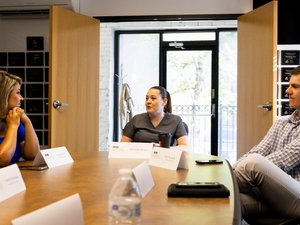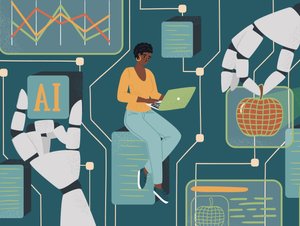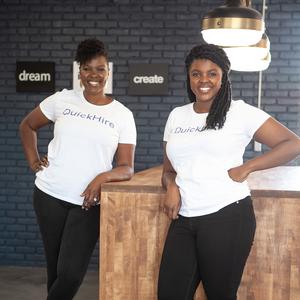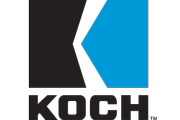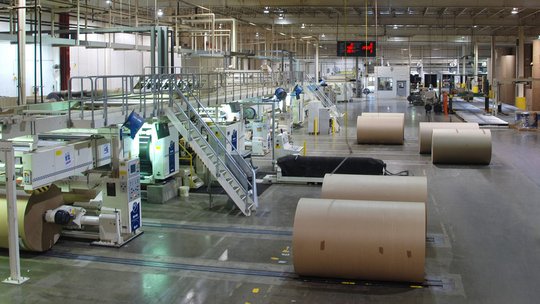
Although Wichita-based Koch Industries' dozens of companies have used artificial intelligence for machine learning and predictive analytics for years, generative AI is a newer frontier for them, company officials say.
“GenAI has democratized access to knowledge and technology in a fashion similar to the internet or the smartphone,” Matt Hoag, Koch’s chief technology officer, said in an email to the WBJ. “We’re already seeing that the most successful 'prompt engineers' are the ones who are subject-matter experts in the business processes themselves, from human resources and legal to manufacturing and supply chain.”
Artificial intelligence has disrupted the business environment in many ways in recent years. While a lot of attention has focused on how the new tech may threaten jobs, employers are also identifying new growth opportunities. According to ResumeBuilder.com, more than 50% of companies nationwide use AI, with more than 20% planning to add it by year's end. In ResumeBuilder's recent survey, business leaders who either utilize or will utilize AI by year's end said 83% of workers who have experience with AI will have more job security.
Koch Industries, with revenues of $125 billion in 2022 according to WBJ research, sees AI as an empowering force, Hoag said, for both the company and the more than 120,000 people who work for it. It is using all types of AI across its companies.
“We believe that when harnessed properly, AI has the potential to ... expand the frontiers of human knowledge,” Rafiq Ajani, Koch Industries' chief data and analytics officer, said in an email.
Koch Industries is neither dipping its toes in the water or diving in completely with new technologies. Instead it is moving at a measured pace, Ajani said.
"What is different about our approach is how we apply our risk philosophy to the challenging decisions surrounding when and how to adopt AI," Ajani said. "Our focus now is striking the proper balance between moving too quickly in this space, as some have done and regretted, and missing opportunities by moving too slowly.
As for AI replacing humans, Ajani said he sees the tool as freeing up employees to "pursue more fulfilling work" by letting the computers do the mundane tasks.
By utilizing predictive insights, he said, the company can enhance operational performance and improve decision making.
How Koch Industries is using AI
With most of the companies under the Koch umbrella utilizing some form of AI, the company sees it as a way to drive production and increase knowledge. However, Ajani said, the company is still “early in our journey.”
AI is being used in improving machinery performance at all of Koch’s manufacturing facilities, Ajani said. It’s also helping with statistical research, including demand forecasting, supply planning, inventory optimization, production scheduling and logistics costs. In addition to helping with the company’s supply chain, the tool also helps with pricing, sales and marketing.
Koch Engineered Solutions is using AI to improve demand forecasting, Flint Hills Resources is using it in its refining operations, and Koch Ag & Energy Solutions is using AI to improve its commercial decisions.
In addition, the company is running a capstone initiative with students in the graduate business program at Wichita State University.
Wichita State University is a founding member of a newly formed AI Institute for Foundations of Machine Learning, which was established by a $20-million grant from the National Science Foundation in 2020. About $700,000 of the grant goes toward the graduate business school.
In late September, Koch held a seminar on AI and its ability to transform a business.
At Georgia Pacific, Koch is utilizing AI to help with the manufacturing process in its more than 140 facilities.
“We are applying AI to build predictive models to improve operational efficiencies and make better preventative maintenance decisions,” Ajani said. “We’re also adding generative AI capabilities that use chatbots to quickly find solutions when we get an operations alert.”
Georgia Pacific, which manufactures paper products, is the second-largest Koch Industries company in terms of employment, coming in at 30,000 workers, according to WBJ data. Molex is the largest employer of Koch subsidiaries, employing 38,000.
AI technologies in use
Because of Koch Industries' size, scope and diversity of businesses, each company under the umbrella selects its own software system, including third-party proprietary solutions and custom-built applications, which are developed on open source and third-party tooling, Ajani said.
"While many of our early solutions are leveraging OpenAI models, we are also using Anthropic models, AWS models, and other models,” he said. “Our solutions are independent of the specific LLMs (language-learning models).”
The use of ChatGPT in November 2022, Ajani said, has significantly accelerated the growth of generative AI capabilities.
"We are seeing many new opportunities to deploy AI for profitable outcomes," he said.
Koch is a cloud-first organization and primarily uses Amazon Web Services for most of its storage and compute requirements, Ajani said. It also uses other cloud services – often selectively.
The new AI in use at Koch Industries
A few months ago, the company introduced “Ask Fred,” an AI tool named for Koch Industries founder Fred Koch that is geared toward employees. The new “reasoning machine,” Ajani said, trains employees to understand and apply Koch’s principle-based management philosophy.
Personal transformation, Hoag said, is key to creating a better business model.
“We’ve already begun to see curious individuals experimenting with and understanding this new generation of AI, harnessing its power to address business challenges and opportunities in new ways,” Hoag said. “We see AI as a tremendous tool that we can leverage to create greater value for our companies, our customers, the communities where we operate and society.”
